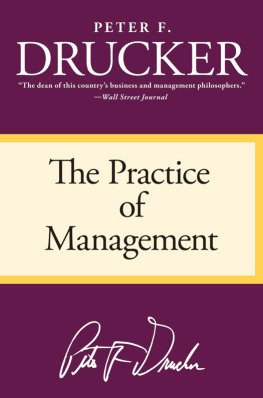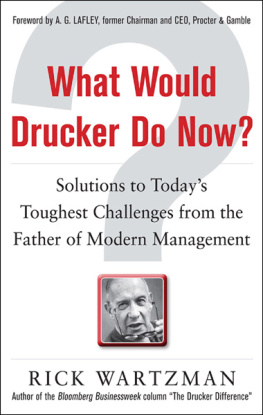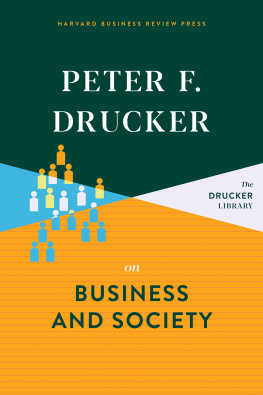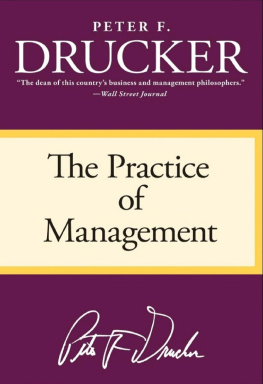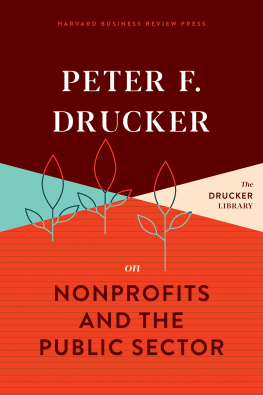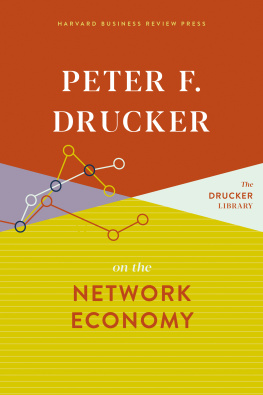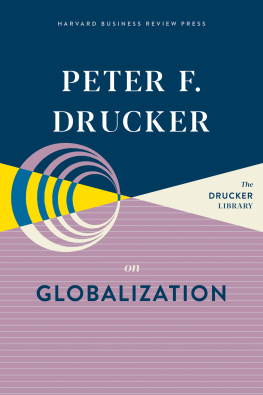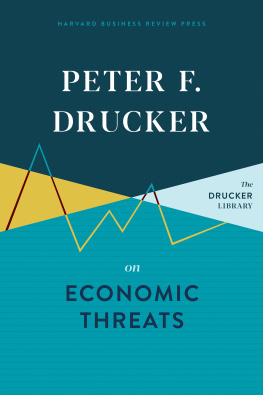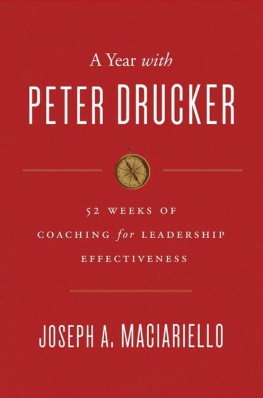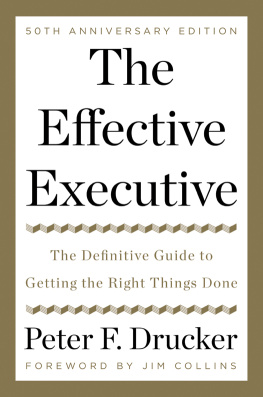DRUCKERS LOST ART OF MANAGEMENT
PETER DRUCKERS TIMELESS VISION
FOR BUILDING EFFECTIVE ORGANIZATIONS
JOSEPH A. MACIARIELLO
KAREN E. LINKLETTER


Copyright 2011 by Joseph A. Maciariello and Karen E. Linkletter. All rights reserved. Except as permitted under the United States Copyright Act of 1976, no part of this publication may be reproduced or distributed in any form or by any means, or stored in a database or retrieval system, without the prior written permission of the publisher.
ISBN: 978-0-07-176748-4
MHID: 0-07-176748-7
The material in this eBook also appears in the print version of this title: ISBN: 978-0-07-176581-7, MHID: 0-07-176581-6.
All trademarks are trademarks of their respective owners. Rather than put a trademark symbol after every occurrence of a trademarked name, we use names in an editorial fashion only, and to the benefit of the trademark owner, with no intention of infringement of the trademark. Where such designations appear in this book, they have been printed with initial caps.
McGraw-Hill eBooks are available at special quantity discounts to use as premiums and sales promotions, or for use in corporate training programs. To contact a representative please e-mail us at bulksales@mcgraw-hill.com.
This publication is designed to provide accurate and authoritative information in regard to the subject matter covered. It is sold with the understanding that neither the author nor the publisher is engaged in rendering legal, accounting, securities trading, or other professional services. If legal advice or other expert assistance is required, the services of a competent professional person should be sought.
From a Declaration of Principles Jointly Adopted by a Committee of the American Bar Association and a Committee of Publishers and Associations
TERMS OF USE
This is a copyrighted work and The McGraw-Hill Companies, Inc. (McGraw-Hill) and its licensors reserve all rights in and to the work. Use of this work is subject to these terms. Except as permitted under the Copyright Act of 1976 and the right to store and retrieve one copy of the work, you may not decompile, disassemble, reverse engineer, reproduce, modify, create derivative works based upon, transmit, distribute, disseminate, sell, publish or sublicense the work or any part of it without McGraw-Hills prior consent. You may use the work for your own noncommercial and personal use; any other use of the work is strictly prohibited. Your right to use the work may be terminated if you fail to comply with these terms.
THE WORK IS PROVIDED AS IS. McGRAW-HILL AND ITS LICENSORS MAKE NO GUARANTEES OR WARRANTIES AS TO THE ACCURACY, ADEQUACY OR COMPLETENESS OF OR RESULTS TO BE OBTAINED FROM USING THE WORK, INCLUDING ANY INFORMATION THAT CAN BE ACCESSED THROUGH THE WORK VIA HYPERLINK OR OTHERWISE, AND EXPRESSLY DISCLAIM ANY WARRANTY, EXPRESS OR IMPLIED, INCLUDING BUT NOT LIMITED TO IMPLIED WARRANTIES OF MERCHANTABILITY OR FITNESS FOR A PARTICULAR PURPOSE. McGraw-Hill and its licensors do not warrant or guarantee that the functions contained in the work will meet your requirements or that its operation will be uninterrupted or error free. Neither McGraw-Hill nor its licensors shall be liable to you or anyone else for any inaccuracy, error or omission, regardless of cause, in the work or for any damages resulting there from. McGraw-Hill has no responsibility for the content of any information accessed through the work. Under no circumstances shall McGraw-Hill and/or its licensors be liable for any indirect, incidental, special, punitive, consequential or similar damages that result from the use of or inability to use the work, even if any of them has been advised of the possibility of such damages. This limitation of liability shall apply to any claim or cause whatsoever whether such claim or cause arises in contract, tort or otherwise.
CONTENTS
PREFACE
This book represents the union of two very different approaches to the study of management. One author is a professor of management, with expertise in management systems, cost management, and project management. The other is a historian. What the authors have in common, however, is that both personally knew Peter Drucker, and have studied his work intensively.
This shared interest in Druckers work was the origin of this book. As we conducted our research independently, it became clear that Druckers vision of management required a deep understanding of the humanities and its goals. Drucker himself called management a liberal art, linking it directly to the humanities disciplines. What we have attempted to do in this book is to discern what Drucker meant by management as a liberal art, and to ground that concept in historical context and practice. It is our belief that, practiced in keeping with Druckers vision, management as a liberal art may offer hope for a more humanitarian, moral society.
contains a discussion of management as a liberal arts contributions to both the liberal arts and management. Because Druckers management philosophy was so driven by ethics and the idea of virtue, we address the questions of values, character, and ethics that are raised by management as a liberal art. Just as a liberal arts education historically emphasized creating people of virtue, management as a liberal art must also deal with these concepts.
The remaining chapters deal with four major topics for putting management as a liberal art into practicefederalism (.
Drucker identified the Federalist Papers, and by inference federalism, as a lasting contribution America has made to Western thought (Drucker, 1954, p. 280). The arguments made by Federalists and Anti-Federalists during the process of ratifying the Constitution of the United States dealt with difficulties and trade-offs .
Organizations are made up of human beings who, while capable of behaving like angels, often insist on behaving perversely. The primary task of management as a liberal art is to provide leadership for human beings to help them fulfill the mission of the organization. The characteristics of human beings at work are topics taken up in .
Finally, Drucker called himself a social ecologist. The work of a social ecologist is to create and maintain a society of functioning organizations. Doing so requires the social ecologist to anticipate discontinuities in society and to manage them through processes that provide for both continuity and change. The practice of social ecology is, in essence, the practice of management as a liberal art for producing a society of organizations that perform according to their missions.
ACKNOWLEDGMENTS
We are indebted to The Peter F. Drucker Literary Trust for their permission to use the Peter F. Drucker trademark in this publication. C. William Pollard, Chairman Emeritus, The ServiceMaster Company, provided the vision and financial support to carry out this project from its inception. We thank Rick Wartzman, Executive Director of The Drucker Institute, for his oversight of this Drucker Institute research project leading to the publication of the book. Zach First, Director of the Drucker Institute, helped us to organize the professional activity associated with advancing the ideas contained in this book. John Peters, Chief Executive of Emerald Group Publishing Ltd., formulated policies for Emerald authors that permitted adaptation of our previously published work in an Emerald journal associated with the Drucker Symposium in Vienna, Austria, on November 1920, 2009.


